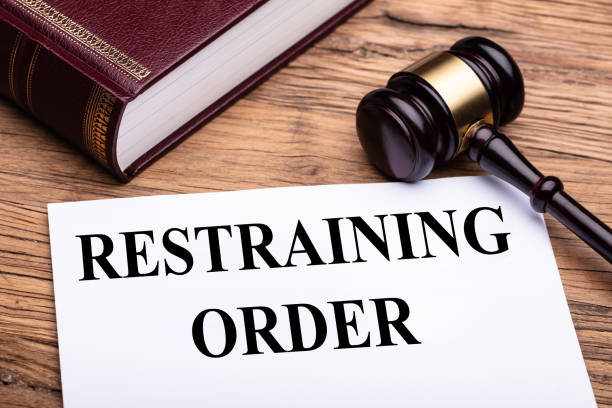


The best Connecticut restraining lawyers and attorneys have seen a surge in civil restraining order applications being filed in Stamford, Greenwich and all over Connecticut, especially in nasty and knockdown Stamford and Greenwich Connecticut divorces, as well as breakups between boyfriends and girlfriends. As the top Stamford and Greenwich restraining order lawyers know, restraining orders can be used as swords—not protective shields—in an effort to humiliate and embarrass people, tarnish their background checks and professional reputations, and even worse, bait them into violating the order so they will get arrested in Stamford or Greenwich for Violation of a Civil Restraining Order under CGS 53a-223b, a felony charge in Connecticut which can carry up to 5 years in prison.
So can you fight these Connecticut restraining orders? Absolutely. But you need to act quickly and competently. Here are the top 5 ways to fight a Stamford and Greenwich Connecticut civil restraining order application…
Top Stamford Connecticut criminal domestic violence lawyers can carefully scrutinize the Stamford restraining order / relief from abuse application affidavit. This is the signed, sworn statement that the applicant makes to the court in support of the restraining order application under penalties of perjury. Remember, the application is formally called a “Relief from Abuse” application, suggesting that the purpose of the application is to stop abuse. (Follow this link for an in-depth discussion of the Connecticut restraining order relief from abuse application process). Notwithstanding, top Connecticut restraining order lawyers and attorneys often see applicants dig up emails that are months old—or even years old—and then try to argue that they are “suddenly” afraid of their spouse or boyfriend, even though they continued to talk, socialize, and even have sexual relations and contact with these spouses and significant others after these alleged threats. You or your top Greenwich restraining order lawyer can easily argue that the evidence is stale, not “recent” as required by Connecticut restraining order law, and the applicant does not truly perceive it as a threat to their personal safety. We’ve seen many applications get thrown out for this.
Top Stamford Connecticut restraining order lawyers often see restraining order applications include threats to “sue,” “financially destroy,” “bankrupt,” and “ruin” the applicant. This is not enough for a restraining order. While these kind of threats can certainly cause a great deal of stress and anxiety, the law says that in order to get a civil restraining order, the threats must be physical in nature. The applicant’s personal safety must in fact be somehow threatened, either explicitly or implicitly. It is a fine semantic line which must be aggressively challenged at your Stamford restraining order hearing. So make sure you or your top Connecticut restraining order lawyer thoroughly examines the allegations for these legal defects, as Connecticut’s restraining order statute is clear about what kind of conduct warrants a restraining order and what doesn’t. (Note that there is new Connecticut restraining order law that protects against stalking and harassment—follow this link to learn more).
A Greenwich, Darien or Stamford Connecticut restraining order application hearing is an adversarial hearing before a Superior Court family judge. Each party is permitted to present witnesses and evidence that will prove their case and disprove their opponent’s argument. (Click here to learn more about the Connecticut Restraining Order application process). As the top Stamford restraining order attorneys and top Stamford domestic violence lawyers know, when fighting a restraining order application, you can offer evidence of text messages, emails, and voicemails of the person who is seeking the restraining order. Are they really in fear of you? Or are they just making up lies and taking emails and conversations out of context to make the judge think you are a true threat? In fighting a restraining order application, you can present the entire email string, text string and voicemail to the judge. You can also subpoena phone records, police reports, 911 calls, text messages, and other documents which will undermine the credibility of the applicant. Don’t be lazy about this—you only get one shot to defend yourself at a restraining order hearing so you or your top Danbury or Stamford Connecticut restraining order lawyer must come completely prepared to a Stamford Superior Court restraining order hearing.
In some cases, it may be worth forcing your Connecticut restraining order accuser to sit for a deposition prior to your restraining order hearing. Depositions are conducted outside the courtroom, usually in a lawyer’s office where your accuser—the restraining order applicant—will be forced to answer a barrage of questions about the details of their accusations, their motives, and anything else you or your top Stamford restraining lawyer feels may be relevant to fighting your case. Depositions can sometimes be a little costly, but we have seen Connecticut restraining orders applications fold and fail when the accuser’s story falls apart during intensive questioning at a pre-hearing deposition.
While you do not always need a lawyer to help you fight the restraining order application in Stamford, Bridgeport, Danbury or New Haven Superior Court, it is something to consider in light of the consequences of losing. Many applications extend to the family’s children, and if you lose, you may be ordered to not have any contact with your own kids if you do not properly fight the application. Additionally, once a restraining order is imposed, it will be inputted into a national database and you will be detained at all United States border crossings for extra questioning, as well as when you are pulled over for a simple traffic stop. And even worse, the order will hang over your head for at least a year, and if you violate it, you can be arrested in Connecticut for felony Violation of a Civil Restraining Order under CGS 53a-223b. The stakes are high in fighting a Stamford restraining order application, so you should consider consulting a top Stamford or Greenwich restraining order lawyer prior to your hearing.